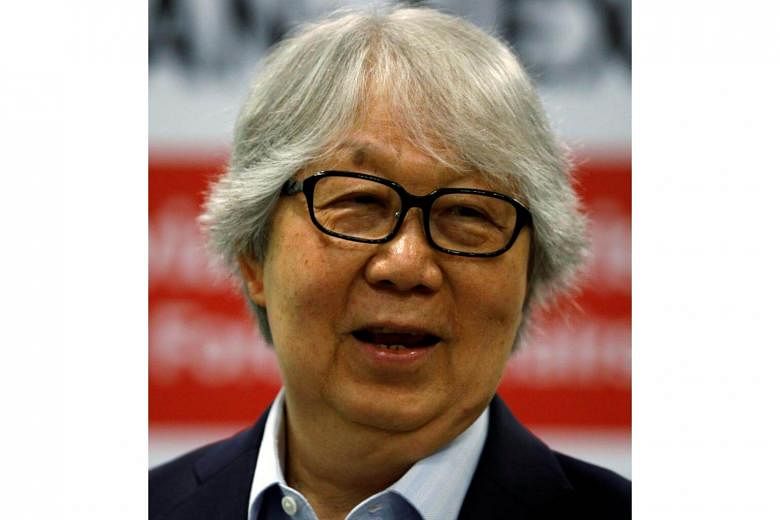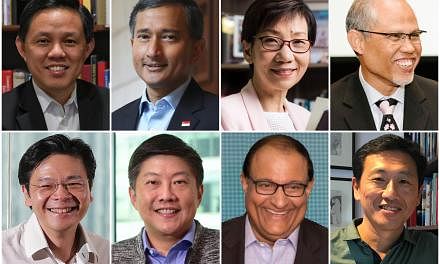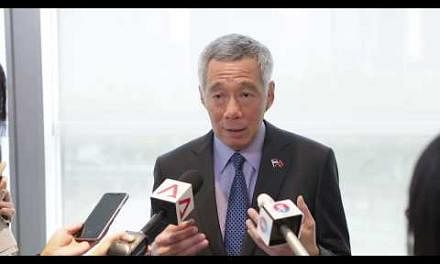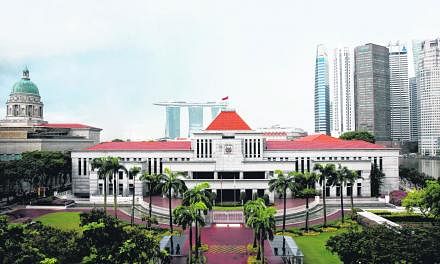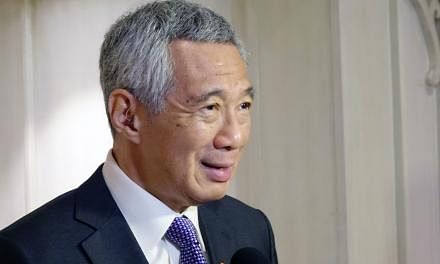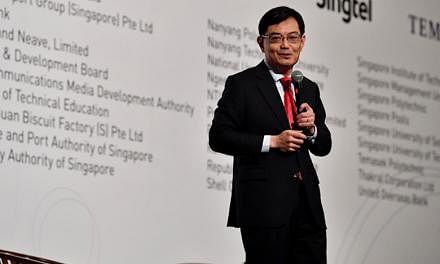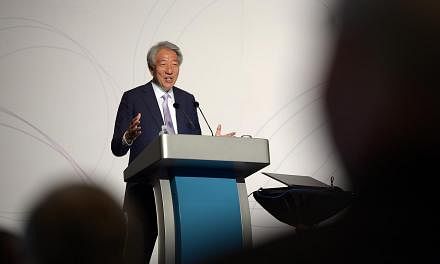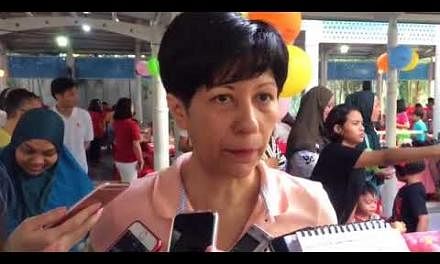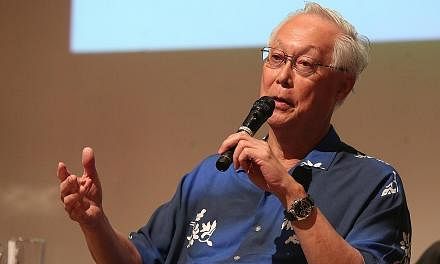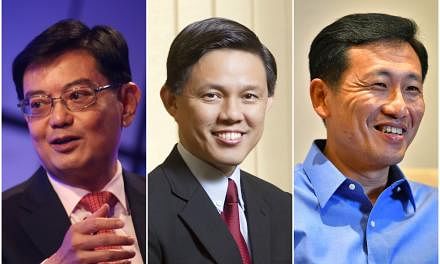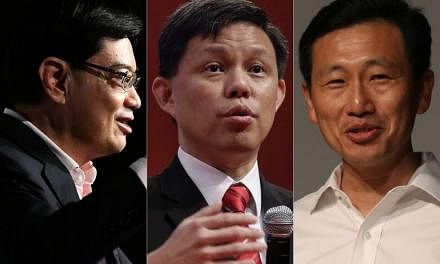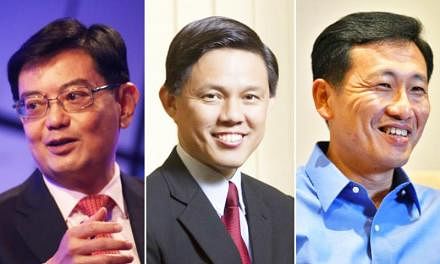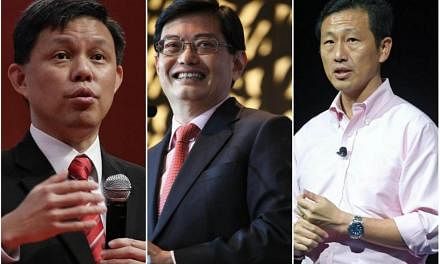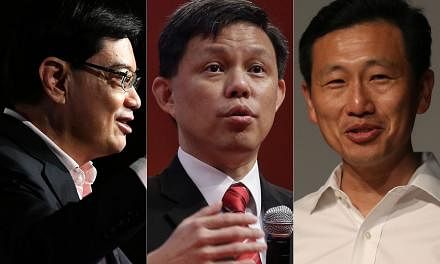One week ago, Professor Tommy Koh, one of Singapore's most respected public intellectuals, put up a Facebook post.
It was not unusual. The veteran diplomat is as prolific an author of social media posts as he is of books and essays.
What set tongues wagging was the content of his post. Prof Koh posted a photo of himself with Education Minister (Higher Education and Skills) Ong Ye Kung, and wrote: "I would describe him as intellectually brilliant, capable of thinking out of the box and coming up with creative solutions to seemingly intractable problems.
"He has both high IQ and EQ. He is charismatic and an eloquent speaker. He has good leadership qualities and is very likeable. He is a man of integrity."
The post attracted others who weighed in with their own encounters with Mr Ong. One said: "Our next PM, hopefully."
Two days later, another public figure made another affirmation of support - this time of a different politician.
At the Singapore Perspectives conference organised by the Institute of Policy Studies, former senior minister of state for foreign affairs Zainul Abidin Rasheed took to the microphone during a dialogue session with Finance Minister Heng Swee Keat.
Mr Heng had earlier sidestepped a question of whether he was "ready to be Singapore's fourth prime minister".
Mr Zainul was not so easily daunted. Almost wistfully, he told Mr Heng, in the hearing of about 1,000 delegates who included civil servants, academics and the media: "I would have been happier if you had answered in the positive."
The crowd laughed.
In Singapore, where political succession planning is traditionally a structured, low-key and impersonal exercise mapped out years if not decades in advance, these public remarks highlight just how unusual the current situation is.
With four years before Prime Minister Lee Hsien Loong's declared deadline of when he wants to step down from the post, Singaporeans are none the wiser as to who the baton will be passed to.
So far, three front runners have been identified by observers: Mr Ong, 48, Mr Heng, 56, and Mr Chan Chun Sing, 48, the labour chief and a Minister in the Prime Minister's Office.
Last Friday, PM Lee dashed expectations that there would be greater clarity on who the fourth PM would be when the Cabinet next tweaks its line-up. The reshuffle will take place after the Budget next month, he said during a trip to India. But there will be no new deputy prime ministers and the process in designating a successor is going to take "a little bit longer".
Singapore's fourth-generation (4G) leadership team - which chooses who will be the prime minister among them - is learning to work together, said Mr Lee. They also need more time for Singaporeans to "get a feel" of them.
"Successor designation - that will depend on the dynamics and I would not say that that is imminent," he added.
Till then, it seems, the field is open for anyone to weigh in on the merits of each contender.
In any other country in the world, this would be par for the course in politics. In Singapore, it is unprecedented.
Prof Koh and Mr Zainul, when contacted, clarified that they were not endorsing Mr Ong or Mr Heng for the PM position .
Prof Koh said he was surprised that many thought he was doing so.
He had worked with Mr Ong when negotiating Singapore's free trade pact with the United States from 2001 to 2004.
"At the moment, there's so much talk about the 4G leaders and their comparative strengths and weaknesses, and I thought since I had the pleasure of working closely with one of them, why don't I share and comment on it with my Facebook friends," he told The Sunday Times. "No other ulterior motive."
Mr Zainul, meanwhile, said: "I (just) wanted to say that people were happy Mr Heng's health is back. From feedback, many Singaporeans are happy about his health being back to normal and would be happy if he succeeds PM, except many are also concerned for him and his family, and that the job and responsibilities of PM will not affect his health or the position."
In May 2016, Mr Heng suffered a stroke but recovered and returned to work in December the same year.
Mr Zainul noted that many Singaporeans are "anxious" about the succession question, from ordinary folk to Emeritus Senior Minister Goh Chok Tong, who on Dec 31 urged the 4G team to name their leader in six to nine months' time.
It prompted a team of 16 4G office-holders to issue a statement saying they would pick a leader among themselves "in good time".
'WHO WILL BE THE NEXT PRIME MINISTER?'
In Singapore, this is a question that has never really needed asking before now.
Way ahead of the last leadership transition in 2004, it was clear that then Deputy Prime Minister Lee Hsien Loong would take up the mantle. He had been DPM for 14 years by then and was considered to be clearly above his peers.
The transition before that was a little hazier. But once Dr Tony Tan, then PM Lee Kuan Yew's first choice as leader, ruled himself out in 1984, the next obvious candidate was apparent: Mr Goh Chok Tong. The question was settled six years before the actual handover in 1990.
It helped that both men had a considerable length of time to prove themselves to Singaporeans.
PM Lee was in politics for a full 20 years before taking on the top job; ESM Goh was in politics for 14 years before becoming PM.
This time around, Singaporeans have not had as much time to get the full measure of the three top contenders for PM, note observers.
Mr Heng and Mr Chan have been in politics for just six years since becoming MPs in 2011, while Mr Ong, elected in 2015, has only had three.
PM Lee has said he plans to step down by 2022, by which point the three contenders would have had 11 years at most to prove themselves to Singaporeans.
Certainly, the trio have been given high-profile responsibilities.
Last year, Mr Heng took on the role of chairing the Future Economy Council to spearhead productivity-driven economic growth. Previously Education Minister, he now helms Finance, which includes delivering the Budget speech.
Mr Chan was appointed deputy chairman of the People's Association, with sway over the powerful grassroots network in Singapore. He has also headed the Social and Family Development portfolio.
Mr Ong is spearheading the charge to ready Singapore's workers for jobs of the future through skills upgrading.
They are also busy making themselves known to the outside world: Mr Heng in China in November, where he expounded on the way forward for Singapore-Sino ties; Mr Chan in Davos last week during which he spoke on the Belt and Road Initiative; and Mr Ong in Washington during PM Lee's October visit to the White House.
SHORTER RUNWAY, HIGHER HURDLE
Some insiders say that within the party leadership, there is already some consensus as to who the next PM should be.
In an interview with The Straits Times earlier this month, Mr Ong said he already has a name in mind - and that it is not himself.
Others have said the choice is an "obvious" one.
If that is the case, why the delay in announcing the person?
Those interviewed point to the rise of social media as well as a more well-educated and questioning electorate and a more volatile global political climate.
More than ever, Singaporeans want a prime minister who is nothing less than an all-rounder who is highly intellectual, has chalked up deep ministerial experience, and has charisma, gravitas and a common touch. This is probably why it has taken longer for the People's Action Party (PAP) to publicly name its next leader - because none of the contenders has definitively proven to the public that he is truly all-in-one, say pundits.
"Even if they roll out the future PM earlier, it probably would not have worked in their favour," said a political analyst who declined to be named. "There would just be a lot of questions about this person on social media. The Government has to take this into account."
This is worrying to some.
Former nominated MP Zulkifli Baharudin, who sits on the board of directors of several companies, said the lack of clarity on PM's successor might be seen as a reflection of a government that is increasingly bending towards populism.
This, he said, has raised concerns among the business community and foreign investors, already frazzled about the move to tighten the inflow of immigrants in response to public sentiment.
"I trust the PAP will not choose its leader based on popularity alone, but choose a leader who is the best man who can bring progress and unite people, not necessarily someone who is likeable."
But other factors could be at play. PM Lee's revelation on Friday that no new DPM will be appointed in the upcoming reshuffle caught many by surprise. The money was on one of the three front runners being elevated - signalling clearly that he will likely be the next PM.
Did something unexpected happen, throwing a spanner in the works? No one knows for sure.
STILL, BUSINESS AS USUAL?
The PAP has long made early succession planning a matter of pride - and national survival. To the party, it is important that investor confidence or the stock market not be rattled by any leadership transition.
Mr Lee Kuan Yew's search for someone to succeed him as PM began as early as the late 1960s, and picked up after Finance Minister Hon Sui Sen in 1976 stressed the need for early succession planning.
Mr Hon told him, according to a 2003 Straits Times article: "When company chairmen and CEOs come to see me, they are not just looking at me, they are looking for who will be taking my place. Because their investments are going to go on a long time - 10, 15, 20 years, and I won't be here...
"They're watching you too. You're still okay, but, you know, they are looking beyond your lifetime."
Former PAP MP Inderjit Singh said the uncertainty today does raise some concerns, but added that it is far better that the party takes its time than rush into a decision.
"If it takes too long, people would start worrying about Singapore's future leadership, although PM's remarks show that he feels it is better to be sure about the next leader before handing over - which is good for investor confidence."
The business community here agreed, saying that while there is curiosity about who will helm Singapore, there is confidence that policies will continue no matter who is eventually anointed.
Mr Jeffrey Hardee, vice-chairman of the board of governors at the American Chamber of Commerce Singapore, said: "The American business community has no reason to doubt that the upcoming succession plan for political leadership will go smoothly. The Government has a system of testing would-be leaders that seems to have worked well and paid dividends."
In his remarks on Friday, PM Lee was asked if he already has someone in mind. To this, he stressed that what was key is that there is "a strong team" in place.
Singapore Business Federation chief executive Ho Meng Kit said all three front runners have shown willingness to engage the business community over the years.
"Businessmen are of course interested in who the next PM will be but what's more important to them is continuity in policies, and they are confident that regardless of who the PM is, there will be continuity," he said.
Just like the rest of Singapore, the business community is divided on who would be the best man for the job, said Mr Ho. "Each of the front runners has his strengths - but isn't that a good thing? Whoever it is, we will have a good leader and we'll still have the other two working with him as a team."
• Additional reporting by Yuen Sin
Correction note: An earlier version of this story said that ESM Goh was in politics for 24 years before becoming PM. It should be 14 years. We are sorry for the error.

